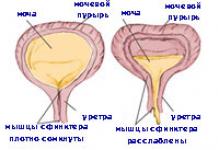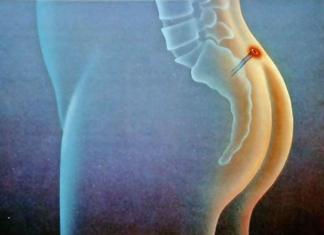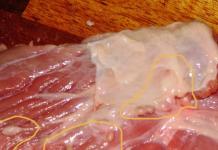Saint Julia, (or, as they usually say today, Julia), was born in Africa, in the city of Carthage. The parents - rich and noble residents of the city - raised their daughter in faith and piety. Little Julia was a smart and obedient girl; she loved to read the Holy Scriptures, the lives of saints... She prayed a lot and fervently to God.
But trouble loomed over the city. Numerous troops of the Persian king surrounded Carthage. They drove rams - heavy battering ram guns - to the city walls and launched an assault. Fire, smoke, screams... Clouds of arrows fly here and there, smashing the defenders, not sparing civilians. The city gates collapsed with a crash and roar under powerful blows. Terrible Persian warriors burst into Carthage and began to rob and kill its inhabitants. In vain did little Julia want to hide from her enemies in a dense garden near her house - they found her and dragged her somewhere...
The Persians captured rich booty in the defeated city. They celebrated the victory cheerfully and noisily, divided the gold and jewelry, and drove the unfortunate captives to the slave market. They also sold Yulia. So the girl became the slave of a rich Syrian merchant.
“Lord, have mercy on me, a sinner! Don’t let me destroy my soul, don’t let me fall away from You, my Savior,” Julia fervently prayed, finding herself among the pagans, in a foreign country, where there was neither a Christian church nor priests. But the Lord said: “The Kingdom of God is within you” - and Julia made her pure soul a temple of God. Day and night, quietly, unnoticed by those around her, the girl prayed to God, and the Lord helped her - he protected her from evil people, taught her how to live... She devoted almost all her time to work and prayer, hardly rested, and fasted strictly. Julia served her master faithfully, never complained about hard work, and worked honestly and diligently. But, if the owner wanted to force her to do something sinful, contrary to God, he could not force the girl to obey him and break the law of God. Many times the wicked pagan tried to force his maid to sacrifice to idols and renounce Christ, but the girl remained adamant. The Syrian beat Julia, tormented her with hard work, scolded and intimidated... Angry at the rebellious slave, he already wanted to kill her, but... The girl was kind, obedient (when it wasn’t about something sinful), hard-working. “Yes, let him pray as he wants!” - the owner finally decided and gave up his attempts.
It was not easy for a young girl to maintain purity among the corrupted pagans.
- Yulia, come with us - her peers, who were going to sinful games, called her - we will dance, sing songs, have fun...
The girl usually didn’t answer the pagans - they wouldn’t understand anyway. She quietly went to some secluded place, where she prayed - talked with God - her only Patron and Father, who protected her in a foreign land... The pagans at first laughed at the girl who seemed strange to them, but gradually they felt the strength of her spirit and began to respect the Christian. The owner noticed that no matter what Julia does, the help of Heaven accompanies her, and therefore the hardworking captive is very useful for his household. He appointed the girl as manager of his estate.
Whether it was long or short, Yulia’s owner got ready for a long journey. Hired a big ship. Servants worked for several days, storing expensive goods in deep holds. The merchant calculated in advance how much profit he would receive if the outcome was favorable...
- You will sail with us - he said to Yulia - I have long noticed that where you are, there are no unpleasant surprises. Yes, and the goods need supervision.
**********
The southern sea sparkles and sparkles in the sun. A fair breeze inflates the colorful sails of the Syrian ship. “Glory to You, Lord, who blesses our path,” Yulia prays. Here, among the endless blue expanse, a green dot appeared and began to quickly increase. Finally, the ship approached the island. “Corsica,” the merchant said importantly, “we are sailing along the intended path. Thank you, oh great gods!” Julia sighed sadly. It was sad for her to look at people drowning in pagan delusions, not knowing the True God. But what is it? What kind of music is heard from the shore, why are so many people gathered around large bonfires laid out right on the coastal sand? The owner sent one of the servants ashore and ordered him to reconnoiter the situation.
- “Oh, sir,” he reported, returning to the ship, “we arrived at a favorable time.” Residents of the island today celebrate a holiday in honor of the great gods - the patrons of Corsica.
- Wonderful! - the merchant was delighted. “We’ll make a sacrifice with them, have some fun, and tomorrow we’ll get down to business.” “And you,” the owner turned to Yulia, “so be it, you don’t have to go ashore. Otherwise you won't get into trouble. Sit quietly on the ship so that none of the local residents see you.
The pagans celebrate noisily. The blood of bulls and rams sacrificed to idols flows like a river, half-naked men and women decorated with flower garlands dance, sing, drink wine...
“Lord, bring some understanding to these unfortunates,” Yulia prays on the ship, “after all, they don’t know that they are perishing, that they will have to suffer forever along with the evil demons whom they serve, calling them gods!” Suddenly there was a rustling sound behind the door, quick steps. “Probably the owner ordered one of the slaves to take something from the ship,” the girl noted to herself and again went into prayer.
One of his servants ran up to the main pagan priest.
- Mister! - he spoke in a hasty whisper - I was just on a Syrian ship. There is one girl there - a Christian. She prays to her God and scolds ours...
- The great gods will be angry at such wickedness! - exclaimed the priest - everyone who is now on this shore or near it must make a sacrifice to our patrons, otherwise they will punish us! ...Why didn’t all your people come to our holiday and sacrifice?! - the head of the pagan gathering addressed the Syrian merchant.
- You are mistaken, oh great priest - the merchant tried to deceive him - all my servants are here.
- Not true. The gods tell me that there is a girl left on your ship who does not want to honor them, scolds and blasphemes them.
- Oh yes... - the merchant hesitated - this is my slave. For many years I tried to turn her away from Christianity, to convince her to worship the great gods. But neither caresses, nor threats, nor harsh punishments defeated her stubbornness. If she had not been faithful to me and so diligent in her work, I would have destroyed her long ago with various torments.
- Make her bow to our gods now and take part in the sacrifice! - the priest frowned - or sell her to me... If you want, I will give four slaves for her - or their cost. And I will be able to break her stubbornness!
- “I have already said,” the merchant answered firmly, “that this girl cannot be turned away from her faith. She would rather die than sacrifice to our gods. But I cannot sell her: if you gave all your property for her, it could not compare with her service - she is really very faithful; my estate increases in her hands, so I entrusted everything to her.
- Well, it’s your choice, merchant,” the priest feigned a smile. - Let's forget about the wicked Christians, let's drink and have fun for the glory of our gods!
The fun became more and more uncontrollable. More and more bowls of wine were presented to the rather tipsy merchant and his servants. Finally, when all the guests were sleeping in a drunken sleep, the head of the priests grinned smugly and ordered:
Bring this Christian woman here immediately! We must force her to renounce her faith before her master wakes up!
The pagans rushed headlong to fulfill their command elders. When Julia was brought in, the priest looked at her with a long, appraising gaze. Thin, pale from labor and abstinence. He looks calmly - is he really not afraid?
- The girl smiled flatteringly and began He- make a sacrifice to the great gods. I will give a ransom to your master and set you free. After all, you want to become free?
- “My freedom is to serve Christ, my God, with a clear conscience,” Julia answered firmly. “I abhor your delusion.”
- Oh, that's what you say?! - the priest discarded the feigned affectionateness - You will bitterly regret this! Hit her on the cheeks!
The torturer ordered Yulia to be tormented by the hair, and then to be undressed and brutally beaten all over her body. But the saint, under blows, spoke loudly:
I confess the One Who was beaten for my sake! My Lord suffered the crown of thorns and crucifixion. May I, His servant, be an imitator of His sufferings, so that I may be glorified with Him in His Kingdom!
Saint Julia was terribly tormented. She bravely endured, strengthened by the love for Christ burning in her heart, invisibly united with Him by the golden thread of prayer. Finally, fearing that the merchant would wake up and take Christ’s servant away from him, leader of the pagans decided to execute Julia.
She said that her God was crucified on the cross - the priest grinned cruelly - if that’s what she wants, let her endure the same!
Hastily put together Corsicans wooden cross, installed it on a small steep hill near the shore, nailed the girl’s arms and legs to it... The Lord Himself, who saved the human race by His death on the cross, strengthened His Bride and eased her suffering.
When Yulia was A already dying, the Syrian merchant woke up. He turned around, opened his eyes in bewilderment and... saw the crucified woman.
What have you done?! - he barely whispered, speechless with horror and pity. At that moment, everyone clearly saw how a shining white dove flew out of the mouth of the martyr and rushed to the sky - the soul left the tortured body of the saint. And in heaven, hosts of angels met Julia and greeted her with joyful jubilation. By God's will, the pagans saw angels, they also saw the holy soul... Horror attacked them and, crushing each other, the idolaters rushed in different directions with screams.
God did not allow His body martyrs be left without burial. Not far from Corsica there is a small island called in the time of St. Julia Margaret. There was a monastery here. The Angel of the Lord appeared to the monks and told them about the martyrdom of the bride of Christ. In awe, thanking God for the miraculous phenomenon, the monks boarded the ship and sailed to the Corsican coast. Here they reverently removed the saint’s body from the cross, wrapped it in a clean shroud and took it to their monastery. There, glorifying Christ, who strengthened His faithful servant for feat, the monks honorably buried Julia in the Church of God.
At the place of the saint’s suffering, a source of pure water flowed out from under a stone. healing water. Some time later, on the site where Julia was crucified, Christians built a temple.
Many miracles happened and still happen to this day at the site of the suffering of the martyr Julia and at her relics.
Saint Julia's Memorial Day is July 29 according to the new style (July 16 according to the church calendar).
All about religion and faith - "prayer of the Holy Martyr Julia" with detailed description and photographs.
Shop on Bolshaya Ordynka, 60/2
Sales department, Varshavskoe sh., 37A
Shop on Tchaikovskogo, 22
In the workshops of the Holy Trinity Brotherhood many church crafts and folk arts are carried out. In the surprisingly short period of existence of the workshops, wood carving has grown into a truly folk craft. Today, the Holy Trinity Brotherhood produces unique carved iconostases, icon cases, lecterns, altars, thrones for the High Place, external crosses, lithium and funeral tables, pulpits and other church interior items. Many churches and monasteries sell icon cases made by Shchigrov craftsmen.
The small provincial town of Shchigry, known only for the fact that the writer Ivan Turgenev settled his “Hamlet of Shchigry District” here, suddenly became... an all-Russian center for the production of church decoration. Here they create genuine masterpieces that adorn the best churches in Russia and abroad. Where did such a miracle come from?
This happened a very long time ago, two hundred or maybe four hundred years after the birth of Christ.
Copyright © 1997-2013 Copying site materials is prohibited Buy an icon – icon gallery
Prayer to the Holy Martyr Julia
- Again about grandfather Mazai
- November 23, 2017
Once upon a time there lived a grandfather Mazai
On a hill above the forests.
Saved the beast from the water -
You heard it yourself.
In the flood in the meadows
On a big plank boat
He swam. Was known
Even in a distant area:
Everything is warm, and this grandfather
Saves for many years!
And there was a desire to climb?!
The onboard wave is shaking.
The wet hares are trembling
And, of course, they become sad:
"Oh, why are there so many of us?
In this fragile ship
It was enough at this hour.
And when will the sun shine? "
The kite hovers over the water;
Looks evil without blinking
And Mazayu says
(Hinting at your lunch):
"Stupid, mischievous old man!
Where are you taking the hares?!
It's already in your yard
Don't get away from the guests!
Choose to suit your outfit
Those that are smooth and healthy!
You are in the boat of everyone!
I know you want to sew some updates
From shaggy gray skins!
And this will not work:
This one is skinny, and that one is dejected;
His eyes are watering.
There's bedlam in your house!
This is a disgrace to the whole village:
Bunnies, hedgehogs - like trash!
You'll start an epidemic!"
Grandfather Mazai did not answer:
How could he leave the hares?
He insulated his barn
For furry guests,
He laid straws for them,
Yes, I brought some cabbage to nibble on.
It will bake, the water will come off -
He will set them free.
In this section you will read articles that I write in collaboration with the Orthodox business publishing house Rusizdat. Church construction and decoration of churches, history of art and history in general, jewelry - this and much more is covered in the magazines “Church Builder”, “Blagoukrasitel”, “Church Jeweler” and “Sacristy”, which I have the honor to represent.
ads
- Copyright
- 18 July 2011
If you want to reprint something from my works, write to me by email - I think we will find a common language.
Life of the Holy Martyr Julia (Julia)
Saint Julia, (or, as they usually say today, Julia), was born in Africa, in the city of Carthage. The parents, rich and noble residents of the city, raised their daughter in faith and piety. Little Julia was a smart and obedient girl; she loved to read the Holy Scriptures, the lives of saints... She prayed a lot and fervently to God.
But trouble loomed over the city. Numerous troops of the Persian king surrounded Carthage. They drove rams - heavy battering ram guns - to the city walls and launched an assault. Fire, smoke, screams... Clouds of arrows fly here and there, smashing the defenders, not sparing civilians. The city gates collapsed with a crash and roar under powerful blows. Terrible Persian warriors burst into Carthage and began to rob and kill its inhabitants. In vain did little Julia want to hide from her enemies in a dense garden near her house - they found her and dragged her somewhere...
The Persians captured rich booty in the defeated city. They celebrated the victory cheerfully and noisily, divided the gold and jewelry, and drove the unfortunate captives to the slave market. They also sold Yulia. So the girl became the slave of a rich Syrian merchant.
“Lord, have mercy on me, a sinner! Don’t let me destroy my soul, don’t let me fall away from You, my Savior,” Julia fervently prayed, finding herself among the pagans, in a foreign country, where there was neither a Christian church nor priests. But the Lord said: “The Kingdom of God is within you” - and Julia made her pure soul a temple of God. Day and night, quietly, unnoticed by those around her, the girl prayed to God, and the Lord helped her - he protected her from evil people, taught her how to live... She devoted almost all her time to work and prayer, hardly rested, and fasted strictly. Julia served her master faithfully, never complained about hard work, and worked honestly and diligently. But, if the owner wanted to force her to do something sinful, contrary to God, by no means could he force the girl to obey him and break the law of God. Many times the wicked pagan tried to force his maid to sacrifice to idols and renounce Christ, but the girl remained adamant. The Syrian beat Julia, tormented her with hard work, scolded and intimidated... Angry at the rebellious slave, he already wanted to kill her, but... The girl was kind, obedient (when it wasn’t about something sinful), hard-working. “Yes, let him pray as he wants!” - the owner finally decided and gave up his attempts.
It was not easy for a young girl to maintain purity among the corrupted pagans.
“Yulia, come with us,” her peers, who were going to sinful games, beckoned her, “we’ll dance, sing songs, have fun...
The girl usually didn’t answer the pagans - they wouldn’t understand anyway. She quietly went to some secluded place, where she prayed - talked with God - her only Patron and Father, who protected her in a foreign land... The pagans at first laughed at the girl who seemed strange to them, but gradually they felt the strength of her spirit and began to respect the Christian. The owner noticed that no matter what Julia does, the help of Heaven accompanies her, and therefore the hardworking captive is very useful for his household. He appointed the girl as manager of his estate.
Whether it was long or short, Yulia’s owner got ready for a long journey. Hired a big ship. Servants worked for several days, storing expensive goods in deep holds. The merchant calculated in advance how much profit he would receive if the outcome was favorable...
“You will sail with us,” he said to Yulia. “I have long noticed that where you are, there are no unpleasant surprises.” Yes, and the goods need supervision.
The southern sea sparkles and sparkles in the sun. A fair breeze inflates the colorful sails of the Syrian ship. “Glory to You, Lord, who blesses our path,” Yulia prays. Here, among the endless blue expanse, a green dot appeared and began to quickly increase. Finally, the ship approached the island. “Corsica,” the merchant said importantly, “we are sailing along the intended route. Thank you, oh great gods!” Julia sighed sadly. It was sad for her to look at people drowning in pagan delusions, not knowing the True God. But what is it? What kind of music is heard from the shore, why are so many people gathered around large bonfires laid out right on the coastal sand? The owner sent one of the servants ashore and ordered him to reconnoiter the situation.
“Oh, sir,” he reported, returning to the ship, “we arrived at a favorable time.” Residents of the island today celebrate a holiday in honor of the great gods - the patrons of Corsica.
- Wonderful! – the merchant was delighted. “We’ll make a sacrifice with them, have some fun, and tomorrow we’ll get down to business.” “And you,” the owner turned to Yulia, “so be it, you don’t have to go ashore. Otherwise you won't get into trouble. Sit quietly on the ship so that none of the local residents see you.
The pagans celebrate noisily. The blood of bulls and rams sacrificed to idols flows like a river, half-naked men and women decorated with flower garlands dance, sing, drink wine...
“Lord, give some understanding to these unfortunates,” Yulia prays on the ship, “after all, they don’t know that they are perishing, that they will have to suffer forever along with the evil demons whom they serve, calling them gods!” Suddenly there was a rustling sound behind the door, quick steps. “Probably the owner ordered one of the slaves to take something from the ship,” the girl noted to herself and again went into prayer.
One of his servants ran up to the main pagan priest.
- Master! - he spoke in a hasty whisper - I was just on a Syrian ship. There is one girl there - a Christian. She prays to her God and scolds ours...
“The great gods will be angry at such wickedness!” - exclaimed the priest - everyone who is now on this shore or near it must make a sacrifice to our patrons, otherwise they will punish us! ...Why didn’t all your people come to our holiday and sacrifice?! - the head of the pagan gathering addressed the Syrian merchant.
“You are mistaken, oh great priest,” the merchant tried to deceive him, “all my servants are here.”
- Not true. The gods tell me that there is a girl left on your ship who does not want to honor them, scolds and blasphemes them.
“Oh yes...” the merchant hesitated. “This is my slave.” For many years I tried to turn her away from Christianity, to convince her to worship the great gods. But neither caresses, nor threats, nor harsh punishments defeated her stubbornness. If she had not been faithful to me and so diligent in her work, I would have destroyed her long ago with various torments.
“Make her now bow to our gods and take part in the sacrifice!” - the priest frowned - or sell her to me... If you want, I will give four slaves for her - or their value. And I will be able to break her stubbornness!
“I have already said,” the merchant answered firmly, “that this girl cannot be turned away from her faith.” She would rather die than sacrifice to our gods. But I cannot sell her: if you gave all your property for her, it could not compare with her service - she is really very faithful; my estate increases in her hands, so I entrusted everything to her.
“Well, it’s your choice, merchant,” the priest feigned a smile. - Let's forget about the wicked Christians, let's drink and have fun for the glory of our gods!
The fun became more and more uncontrollable. More and more bowls of wine were presented to the rather tipsy merchant and his servants. Finally, when all the guests were sleeping in a drunken sleep, the head of the priests grinned smugly and ordered:
– Bring this Christian woman here immediately! We must force her to renounce her faith before her master wakes up!
The pagans rushed headlong to fulfill their command elders. When Julia was brought in, the priest looked at her with a long, appraising gaze. Thin, pale from labor and abstinence. He looks calmly - isn’t he afraid?
“Maiden,” smiling flatteringly, he began He- make a sacrifice to the great gods. I will give a ransom to your master and set you free. After all, you want to become free?
“My freedom is to serve Christ, my God, with a clear conscience,” Julia answered firmly. “I abhor your delusion.”
- Oh, is that what you say?! - the priest discarded the feigned affectionateness - You will bitterly regret this! Hit her on the cheeks!
The torturer ordered to torment Yulia by the hair, and then to strip her and brutally beat her all over her body. But the saint, under blows, spoke loudly:
- I confess the One Who was beaten for my sake! My Lord suffered the crown of thorns and crucifixion. May I, His servant, be an imitator of His sufferings, so that I may be glorified with Him in His Kingdom!
Saint Julia was terribly tormented. She endured courageously, strengthened by the love for Christ burning in her heart, invisibly united with Him by the golden thread of prayer. Finally, fearing that the merchant would wake up and take Christ’s servant away from him, leader of the pagans decided to execute Julia.
“She said that her God was crucified on the cross,” the priest grinned cruelly, “if that’s what she wants, let her endure the same!”
Hastily put together Corsicans wooden cross, installed it on a small steep hill near the shore, nailed the girl’s arms and legs to it... The Lord Himself, who saved the human race by His death on the cross, strengthened His Bride and eased her suffering.
When Yulia was A already dying, the Syrian merchant woke up. He turned around, opened his eyes in bewilderment and... saw the crucified woman.
-What did you do?! – he barely whispered, speechless with horror and pity. At that moment, everyone clearly saw how a shining white dove flew out of the mouth of the martyr and rushed to the sky - the soul left the tortured body of the saint. And in heaven, hosts of angels met Julia and greeted her with joyful jubilation. By God's will, the pagans saw angels, they also saw the holy soul... Horror attacked them and, crushing each other, the idolaters rushed in different directions with screams.
God did not allow His body martyrs be left without burial. Not far from Corsica there is a small island called in the time of St. Julia Margaret. There was a monastery here. The Angel of the Lord appeared to the monks and told them about the martyrdom of the bride of Christ. In awe, thanking God for the miraculous phenomenon, the monks boarded the ship and sailed to the Corsican coast. Here they reverently removed the saint’s body from the cross, wrapped it in a clean shroud and took it to their monastery. There, glorifying Christ, who strengthened His faithful servant for feat, the monks honorably buried Julia in the Church of God.
At the site of the saint’s suffering, a source of pure healing water flowed out from under a stone. Some time later, on the site where Julia was crucified, Christians built a temple.
Many miracles happened and still happen to this day at the site of the suffering of the martyr Julia and at her relics.
Icon of Saint Julia
At the dawn of Christianity, an endless sea of blood was shed due to the establishment of a new faith. Many innocent men and women died. Among them were those who were sincere in heart and pure in spirit, selflessly resisting the persecution and torture of the pagans. Subsequently, these people were canonized.
In this article we will talk about the holy martyr Julia of Carthage, her life and the miracles exuded by the icon.
There are two legends, repeating each other only in separate fragments. According to one of them, Saint Julia (or Julia) was born in Carthage, into a noble family. She grew up as an obedient, beautiful, intelligent and sympathetic girl. She prayed earnestly and read the Holy Scriptures. When the city was captured by Vandals in 439, a ten-year-old girl was taken prisoner and soon sold into slavery to the Syrian merchant Eusebius. Despite her situation, Julia found freedom within herself and began to work conscientiously. Her owner was a pagan and more than once argued with the girl, asking her to convert to paganism. Julia was devoted to Christ. She continued to pray fervently and, with the permission of Eusebius himself, occasionally read the Holy Scriptures.
Several years passed like this. One day the owner loaded the ship with various goods, took the girl with him (as a talisman to protect against troubles) and set off for Gaul, a rich country at that time. Eusebius ordered a landing in Corsica (near the city of Nonza), where a bull was sacrificed to the pagan gods. He decided to join the celebration. The young Christian woman asked to stay on the ship. She cried that so many people live in error.
When the local governor, Felix Saxo, found out about the Christian slave, he got Eusebius drunk. After the guest fell asleep, by order of Felix, Julia was lowered ashore. The governor ordered the young maiden to make a sacrifice to the gods. The bold refusal infuriated Felix. And Julia was immediately sentenced to death through cruel torture. The girl's face was bloodied, she was dragged by her hair, and then crucified. During the torture, Julia whispered prayers. She did not resist, but humbly accepted her fate. With her last breath, a dove flew out of the martyr’s mouth as a symbol of purity and innocence. Neither bird nor beast touched the girl's body after her death.
This is precisely the version of the life of Saint Julia that the clergy in the diocese of the city of Ajaccio adhere to.
Another version
According to the second version, which is also welcomed by the Corsicans, Julia was a native of the city of Nonza and a contemporary of Saint Devota (about 303). For refusing to bow to pagan idols and sacrifice to them, the girl was tortured and then killed. They cut off both her breasts and threw them off a cliff. In the place where they fell, two healing springs opened. After this, the enraged executioners tied Saint Julia to a fig tree, where she died in pain. At this time, a dove flew out of the maiden’s mouth. This moment exactly repeats the previous version of the life of the martyr.
Icons depicting saints carry spiritual value. They protect, protect and help believers in difficult situations. Many women with the name Julia and others turn to the image of the martyr. It is a symbol of unshakable faith and chastity. There are several options for embodying the image of the Virgin Julia.
The Corsican version of the life is directly reflected in the iconography. The Holy Martyr Julia is depicted crucified on the cross, with her nipples cut off. An example of this is a painting dating back to the 16th century. It has survived to this day and is located in the Church of the Holy Martyr in the city of Nontse. There you can also venerate the statue of a Christian virgin. According to local confessors, the image is miraculous. Everyone who turns to him with sincere prayer receives blessing and help.
On Orthodox icons, Saint Julia is traditionally represented with the Holy Scriptures (or a crucifix in her hand). There are also so-called family images, in which the martyr is depicted together with other saints (St. Vladislav, Prince of Serbia, St. Nadezhda of Rome, the young woman, St. David of Thessalonica). Also, folk craftsmen have proposed several options for the execution of icons. The faces of St. Julia embroidered with beads are considered real masterpieces. Characteristic points here are white clothes as a symbol of the virgin’s purity and innocence and a look full of courage.
Body icons or medallions are becoming more and more popular. They are made by jewelers from silver and gold and are spiritual amulets for believers. Usually these are images of the face of St. Julia. Rare ones include jewelry images of the martyr in the hands of the Guardian Angel.
The Corsican martyr of Nonza has been revered since her brutal murder. For this purpose, a sanctuary (or sanctuary) was built near the city. However, in 734 it was destroyed by barbarians. In addition, holy springs are open on the island, to which local pilgrims flock with requests for healing and protection.
Saint Julia's Day is celebrated annually in Corsica. The martyr herself, according to the decree of the Sacred Congregation of Rites of August 5, 1809, is considered the patroness of the island.
According to one legend, the body of the martyr was discovered by the monks of the island of Gorgon and buried in their monastery. Before this, an angel appeared to them and told about the girl’s suffering and her feat for the sake of the faith of Christ.
Much later, the holy relics were transferred to the city of Brescia in northern Italy. Every year thousands of believers come here to venerate Saint Julia of Carthage and ask for help. Here you can also purchase icons of the martyr. According to the clergy, she is the patron of mothers and sick children.
Absolutely everyone who needs help and healing can turn to the image of Saint Julia in prayer. In Orthodox sources you can find a troparion in honor of the martyr. It is often attached to personalized icons. Also, invoking a saint is possible with the help of a common prayer: “Pray to God for me, holy saint of God, Martyr Julia, as I diligently resort to you, an ambulance and prayer book for my soul.” It is after this part of the address to the saint, according to Orthodox custom, that the troparion is to be read.
According to legend, at the burial site of the Carthaginian martyr, a healing spring emerged from under a stone. He performed many miracles: he helped the blind to see, the deaf to begin to hear, the weak to stand on their feet, and barren women to give birth. Miracles still happen today. They are exuded by the holy image of Julia in the temple, built many centuries ago on the site of the crucifixion of the martyr.
The city of Sainte-Julie in Canada, Quebec, is named after Saint Julia of Carthage. An asteroid that was discovered in 1866 is also named after her.
In the Orthodox tradition, another martyr named Julia is revered. She is one of the seven holy virgins who were drowned in the lake after cruel torture for the faith of Christ. Later their bodies were burned by the pagans. The saint is called Ancyra (or Corinth) after her place of birth. Her memory day is celebrated on May 31 and November 19 according to the new style.
Rating 4.1 votes: 42Holy Martyr Julia of Carthage
Among the Orthodox, the name Julia is given to girls at baptism in honor of Saint Julia of Carthage. Julia (Julia) became famous for her martyrdom for the faith of Christ.
She was born in the city of Carthage on the Mediterranean coast. By the time of her birth, the city already had a Christian faith. The girl grew up with loving parents who raised her in Christianity, and those around her admired her and admired her intelligence. Childhood happiness did not last long - when Julia was 10 years old, Vandals attacked Carthage. The city was covered in a shroud of smoke from endless fires; the girl’s parents were killed, but she herself remained alive.
Together with the rest of the inhabitants, Yulia was driven to a foreign land, where they wanted to sell them all into slavery. Despite the grief of the loss, little Julia steadfastly endured all the hardships and hardships of the journey, prayed and encouraged those around her.
In Syria, Julia was sold into slavery to a merchant. Of course, it was hard for the little slave, but she did not lose heart and remembered the fate of Joseph, who was sold into Egyptian slavery. The merchant, despite his pagan worldview, was not a bad person and soon began to appreciate Julia’s hard work. A couple of times he entrusted her with small orders related to trade, and Julia fulfilled them quickly and well. Julia became his indispensable assistant, as she knew how to read and write, and his merchant business went uphill. The merchant even thought about giving the girl in marriage to his nephew, but she stubbornly did not want to worship pagan idols. In the end, the owner abandoned this pointless activity. And everything would have been fine if one day he had not had to go to Gaul on trade business...
On the way to Gaul, the ship on which the merchant and Julia were sailing landed in Corsica for fresh water. A merchant got from a ship to a ball, or rather to a pagan sacrifice with a drunken feast. Julia stayed on the ship so as not to observe this abomination, and prayed. One of the Corsican pagans caught her doing this. He told his compatriots about the Christian woman on the ship, who began to demand her for themselves through persuasion and threats. But the merchant did not want to part with his assistant. Then the Corsicans resorted to a trick. They gave him wine and stole Julia from the ship. They tried by force to force the girl to worship pagan deities, but Julia quietly insisted that she had only one God - Jesus Christ. They beat her like a man, but she only whispered prayers to the Lord. She was crucified on the cross, and the merchant, who woke up from his drunkenness, rushed to her, but it was too late.
And then everyone witnessed a miracle. With her last breath, a white dove flew out of the girl’s mouth and rushed into the sky, and the cross was surrounded by angels with their divine singing, from which the amazed tormentors rushed to run in different directions.
A few days later, monks who had a vision came to pick up her body. They buried her on the island of Gorgon. And at the site of her crucifixion, a temple was soon built, where many miracles and healings still occur. July 29 is the date of memory of the holy martyr Julia of Carthage.
Quite a lot of information has been preserved about early Christianity, as a period of cruel reprisals against the followers of the teachings of Christ. Adherents of the new faith were subjected to terrible, deadly torture, but they did not renounce their views and remained devoted to the end in serving the one God. This is the story about Julia (Julia) of Carthage.
The meaning of the icon
It is worth noting that the icon of St. Julia of Carthage is equally revered in both Orthodoxy and Catholicism. The spiritual feat of this girl inspired various artists to create a miraculous image of her. Thus, in the city of Nontse - the place where Saint Julia was killed as a result of torture, there is a small church dedicated to her, in which there is an icon of the saint.
Julia (Julia) Carthaginian martyr
This image of her, according to the stories of pilgrims, granted healing to many, which is why many strive to get to this place, unfamiliar to most.
The icon of Saint Julia of Carthage is an example of the steadfastness of faith, a symbol of infallible fidelity to God and resignation in accepting torment, readiness to endure any suffering and not to renounce Christ.
Important! The significance of this icon is especially great for people who have dedicated their lives to God today. The image of Saint Julia helps them cope with the hardships of monastic life and strengthens them in the faith.
What does it help with?
The icon of Saint Julia helps and protects believers in difficult everyday situations. Helps to maintain faith when despair and disappointment creep into the soul. For women bearing this name, the image of Saint Julia is a helper and guide in life.
Important! According to the testimony of women, the icon of Julia of Carthage helps in many women’s affairs, therefore they often pray to this Saint for the health of children, for offspring, for the preservation of the family.
Many legends have appeared around the life of Saint Julia for many centuries.
So, according to one of them, after the martyrdom of the Virgin Julia, her body, some time later, was found by monks living on the island of Gorgon. Here, in the Gorgon monastery, the body of Saint Julia was buried, and her relics were sent to one of the cities of northern Italy, where to this day miracles of healing occur around the image of Saint Julia.
Description of the Holy Face
It should immediately be noted that the main images of Saint Julia of Carthage are divided into two types:

In the city of Nontsa, in the church located at the site of the execution of the Holy Great Martyr Julia, an iconographic image is kept, which depicts Saint Julia of Carthage in accordance with the historical accuracy with which her execution is described. This is how she is represented, as well as Jesus Christ, on a crucifixion, with her breasts cut off during torture. This icon painting has been known since the 16th century and has several copies.
However, in Russia such an iconographic image was not accepted due to special chastity in accordance with Orthodox canons, which prohibit the depiction of a naked body on icons, even if this is evidence of the torture to which Saint Julia was subjected.
For this reason, Russian Orthodox Church knows another image of Saint Julia of Carthage - in it she holds the Holy Scriptures in her hands, and in later copies of the icon - a crucifix. In addition, there are several more versions of the icon of St. Julia, on them she is depicted next to such Saints as Nadezhda of Rome, St. Vladislav - the Serbian prince and the Monk David of Thessalonica.
Interesting! Craftsmen from the people and jewelers also fell in love with the image of the Saint. Therefore, you can find not only traditional icons, but also those made using the bead embroidery technique, as well as body pendants with the image of the holy face.
Holy Martyr Julia
When the Persians took the famous city of Carthage in Africa1 and took many of the inhabitants captive, at that time, along with other captives from this city, that little girl about whom we will talk, blessed Julia, the daughter of one famous person Analson; she was taken to Palestine Syria and sold into slavery to a certain merchant, an impious pagan. The girl, although she was with an unfaithful master, nevertheless firmly adhered to the holy faith in Christ, in which she was born, and to the good Christian customs that she had learned from infancy - she often prayed and fasted. Having become a maiden, she carefully kept herself pure, lived chastely and in strict abstinence, and faithfully served her master, according to the words of the Apostle: “In the simplicity of your heart, not with only visible obligingness, as pleasing to mankind.”iki" (Eph. 6:5-6), but as if in the eyes of God, doing with prudence all those tasks entrusted to her, those things that were not contrary to God and her chaste life, and what was contrary, no one could do her Her master strongly forced her to renounce Christ and persuaded her to live wickedly according to their pagan customs; but no threats could persuade her to do so, because she was ready to die rather than renounce Christ or lose her chastity. destroy her, but seeing that she served faithfully and worked hard, he spared her and was amazed at her good disposition, meekness, humility and strict fasting; he saw that she fasted every day, except Saturday and Sunday, during her free time from work; spent not in idleness and peace, but either in warm prayers to God, or in reading books, which she learned in childhood; she rarely went to bed at night, and she always looked pale, dry, exhausted from work and abstinence. Her owner was very surprised at this and, seeing that she was still doing the same thing, began to pity her, love and respect her: it was God, fatherly protecting His saint, Saint Julia, who bowed to her mercy the cruel heart of an unfaithful man. She was already more than twenty years old when her owner - he was a merchant - decided to sail with many goods to Gaul. He also took with him his faithful slave Julia, since he saw that his property was increasing under her supervision: God blessed the house of that merchant for her (as once in Egypt the house of Pentephry for the sake of Joseph (Gen. 39:5)). That is why, along with his rich goods, he took his servant, or rather Christ’s, who was more valuable than any other commodity, and set sail. He landed on the island of Corsica2, which he was sailing past. Although there were Christian cities on this island, there were also many pagans, and when this merchant landed on that island, he saw near the pier a gathering of his pagan co-religionists, celebrating a festival and making sacrifices to demons. He went out to them with all his servants, bought a fat bull, made a nasty sacrifice with the pagans, and everyone began to eat, drink and have fun. Saint Julia remained on the ship and in the depths of her heart sighed and cried, grieving over the error and death of these people.
One of that gathering came to the ship, saw Julia, the girl crying and sighing, found out that she was a Christian, went and secretly said to the leader of that gathering, who was in charge of the sacrifices:
“There is a girl on the landing ship who blasphemes our gods and condemns us for making sacrifices to them.
Immediately the leader of this wicked gathering asked the Palestinian merchant:
- Why didn’t all your people come from the ship to our holiday and sacrifice?
To the merchant's response that everyone had come,
the chief objected:
“I hear that on your ship there is some girl who scolds and blasphemes our gods.
The merchant replied:
-Are you talking about my slave? Yes, in no way could I turn her away from Christian error and persuade her to our faith, neither with caresses nor with threats; and if she had not been faithful to me and so diligent in her work, I would have destroyed her long ago with various torments.
The boss told him:
- Now make her worship the gods with us and take part in the sacrifice; either I will give you four of my slaves instead of her, or take her value in money, just give her to me, and I will make her worship our gods.
The merchant replied:
“I told you that it is impossible to force her to do this, because she would rather die than renounce her faith.” And I cannot sell her to you: if you gave me all your property for her, then even this would not compare with her service; Indeed, she is very faithful, and my estate increases in her hands; That's why I entrusted everything to her.
The leader of the gathering, having secretly consulted with his people, arranged an even larger feast for the sake of the guests and made the merchant, Julia’s owner, very drunk with wine. Having drunk, he fell fast asleep, and everyone who was with him also fell asleep from the wine. Then the wicked pagans from that island hastened to the ship, brought Saint Julia to land and brought her to their commander. And the chief said to her:
“Girl, make a sacrifice to the gods, I will give your master whatever ransom he asks for you, and I will set you free.”
The saint answered:
- My freedom is to serve Christ, Whom I serve every day with my clear conscience; and I abhor your delusion!
Then the boss ordered to hit her on the cheeks. And the martyr said:
- If my Lord Jesus Christ endured a blow on the cheek and spitting in the face for me, then won’t I endure the same for Him! let them hit me on the cheeks for Him, and instead of spitting, let tears flow down my face!
The tormentor ordered her to be tormented by her hair, stripped naked and brutally beaten all over her body. And the martyr, while she was being beaten, spoke loudly:
- I confess the One Who was beaten for my sake! My Lord suffered the crown of thorns and crucifixion. May I, His servant, be a participant and imitator of His sufferings, so that I may be glorified with Him in His Kingdom!
Then the torturer ordered her virgin breasts to be cut off; She courageously endured all these fierce torments for the sake of love for Christ. The torturer, wanting to quickly destroy her before her master woke up, ordered to quickly make a cross and crucify the martyr on it, as the Jews once crucified Christ. And Saint Julia in her suffering for Christ became like the crucified Christ the Lord Himself, being deemed worthy to be crucified on the cross for Him.
When she was hanging on the cross and was already close to death, her master woke up and, as soon as he saw her crucified, what great pity filled his heart! but nothing could be done to help: the bride of Christ was already at her last breath. When her holy soul was freed from bodily bonds, everyone saw how a dove, whiter than snow, flew out of her mouth and flew up to the sky; in addition, those who tormented her saw angels; and great fear fell upon everyone; everyone fled from there, and only the lifeless body of the saint was left hanging on the cross3. But Christ the Lord did not leave him: He commanded His angels to keep him until he gave her an honest burial, as follows.
Not far from the island of Corsica there is a small island, formerly called Margarita, and now Gorgon; there was a monastery on it; there the angel of the Lord appeared to the monks, told them everything that had happened to the holy martyr Julia, and commanded them to quickly sail on a ship to that island, remove the long-suffering body of the holy martyr from the cross and bring it to their monastery for burial. The monks boarded the ship, set the sails and sailed away; Having reached the pier, they found everything as the angel of the Lord had told them. Having removed the holy body from the cross, they wrapped it in a clean shroud. They also found her cut off breasts, thrown nearby and lying near a stone, took them and put them in their place with the body; then they carried the body to the ship and returned safely to their monastery; there the body was buried with honor in the church, glorifying Christ God, who strengthened His servant for such a martyrdom. At her grave, miracles began to be performed and healing of all kinds of diseases was given; miracles were also performed at the place where she suffered. The Christian inhabitants of that island also learned about the saint’s suffering and built a small church in her name on the very spot where she was crucified, because it was crowded there: this place was a steep hill. And where her severed breasts were thrown, a source of spring water flowed out from under the stone, which was healing: all the sick who drank that water or washed themselves with it received recovery. Another miracle happened: that stone, which was touched by the saint’s breasts (and from under which a source flowed), in those days, every year on the day of her memory, it seemed to emit sweat, drops of milk and together blood, to signify virginity and martyrdom Saint Julia, who, like milk, was white with virgin purity and stained with the blood shed for Christ. And such drops dripped all that day, from morning to evening; they were anointed with them and received healing.
After many years, that church in the name of the holy martyr, built on the site of her suffering, became dilapidated and partly collapsed. Then they wanted to build a new, larger church in the name of the saint in another place, more spacious - since it was very crowded - but nearby. When they prepared the stone, brick, lime and everything necessary for the construction, and already wanted to lay the foundation the next day, they found all this material, stones, bricks and everything else in the morning in the same place where the old church lay; The builders were perplexed. However, a little later, they again moved everything to that new place, intending to build a new church there; but everything moved back to its original place at night. That night, the watchmen saw a fair-haired maiden putting all the material prepared for construction on a cart drawn by a pair of light-colored oxen and transporting it to its original place; They understood that the saint wanted the temple to be rebuilt in its former place, and they did it according to her wishes. There were many other miracles on both islands, Corsica and Gorgona, until the holy relics of the saint were taken from there and transferred to Brescia4. And after the transfer of the relics, the inhabitants of Corsica come with faith to the holy temple, are not deprived of her help and are preserved from the attacks of her enemies by the holy and indestructible prayers and mercy of our Lord Jesus Christ, to whom, together with the Father and the Holy Spirit, is given honor and glory, now and to endless ages. . Amen.


























